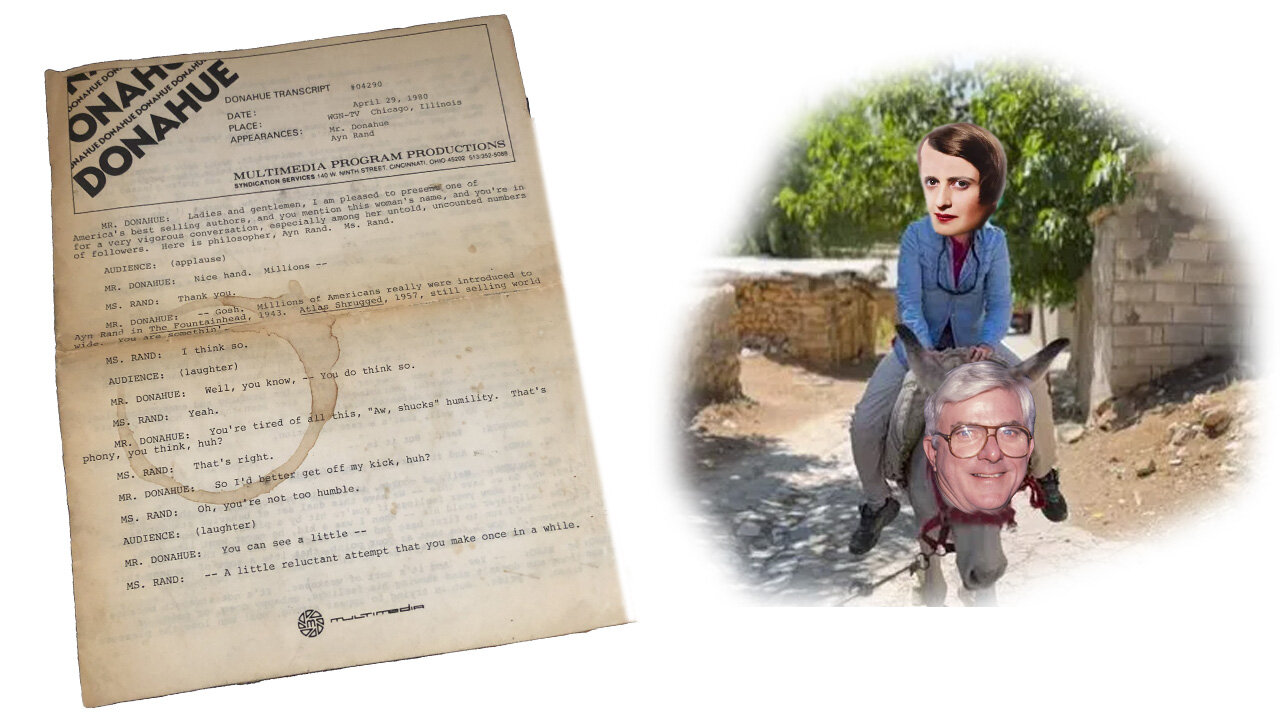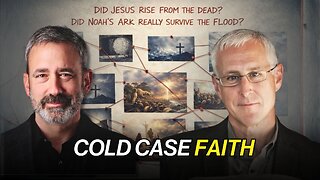Premium Only Content

Ayn Rand Interviewed By Phil Donahue (1979)
I used my best A.I. skills to fix this vid - looks quite nice now.
In 1979, Ayn Rand appeared on The Phil Donahue Show in what has since become one of the most widely circulated televised interviews of her career. This televised encounter between the famed author-philosopher and the populist talk show host offers a vivid portrait of Rand late in life, still unflinching in her convictions, and still as polarizing as ever. The interview is remarkable not just for what it reveals about Rand’s philosophy, Objectivism, but for how it captures the tension between her stark worldview and the public’s reaction to it.
From the outset, Donahue sets the tone with a mix of admiration, curiosity, and challenge. He introduces Rand not only as the author of Atlas Shrugged and The Fountainhead but as a woman whose ideas have sparked passionate debate for decades. Rand, characteristically poised and precise, wastes no time laying out the basics of her worldview: the virtue of selfishness, the immorality of altruism, and the primacy of reason over emotion. The audience, however, is not always receptive. What follows is a collision of ideals—a rare spectacle where abstract philosophical positions are dragged into the arena of daytime television.
What makes the interview compelling is not just Rand’s defiant tone or her sharp wit, but the format itself. Donahue's audience, representative of mainstream America, is visibly unsettled by her rejection of compassion as a moral ideal. She argues that altruism—living for the sake of others—is a corrupting force that denies individual worth. In response to audience questions, Rand doubles down, claiming that helping others is fine only if it’s in your rational self-interest, not a moral duty. These responses draw both applause and incredulous laughter, highlighting how deeply her views clash with conventional moral sensibilities.
Donahue himself plays an important role as a sort of philosophical translator. He challenges her, often echoing the audience’s moral discomfort, yet he treats Rand with respect and intellectual seriousness. Their exchanges are tense but civil, allowing Rand the space to articulate her philosophy clearly. He asks pointed questions about love, government, and charity, and although Rand often answers with dogmatic certainty, she remains intellectually consistent. Her disdain for collectivism, welfare, and unearned guilt is unwavering.
One of the most powerful moments of the interview comes when Rand explains her concept of love—not as a selfless act but as a deeply selfish one. Love, for Rand, is a response to values, and thus to love someone is to affirm one’s own moral code. This reversal of romantic idealism into moral egoism is vintage Rand—chilling to some, liberating to others. It is in such moments that the interview transcends the usual talk-show banter and becomes a genuine confrontation of opposing worldviews.
Visually, the interview is unremarkable. It has the look and feel of late 1970s daytime TV: drab set, handheld mics, audience in rows. Yet the intellectual content is dense, even jarring. There’s a strange dissonance between the medium and the message—Rand’s hyper-rationalist, anti-populist ideology seems oddly out of place in the emotionally driven format of a daytime show. And yet, that contrast is precisely what gives the interview its power. It shows how Rand’s ideas, while marginalized by academia for decades, found a wide if uncomfortable public forum through mass media.
Critically, the interview also reveals some of Rand’s limitations. Her unwillingness to acknowledge nuance—especially in matters of social inequality, empathy, or historical context—makes her answers feel rigid. For instance, when questioned about the role of government in education or healthcare, she insists that no such functions are legitimate, without offering practical alternatives. Her confidence borders on arrogance, and for many viewers, this would have only reinforced the image of Rand as unyielding and ideologically extreme.
Nevertheless, the interview remains a seminal document. It captures a moment when one of the 20th century’s most divisive thinkers stepped into the spotlight and defended her philosophy without compromise. For fans of Rand, it is a heroic stand; for critics, a troubling display of cold logic and moral detachment. But for anyone interested in the clash between individualism and collectivism, reason and emotion, or philosophy and popular culture, the Donahue interview offers a fascinating glimpse into a world where such ideas were laid bare—and judged—in real time.
In sum, Ayn Rand Interviewed by Phil Donahue (1979) is more than a cultural artifact. It is a philosophical showdown disguised as a talk show—a tense, illuminating, and often uncomfortable dialogue between a radical thinker and the society she challenged at its core.
-
 1:01:28
1:01:28
BonginoReport
10 hours agoClinton Questioned on Ties to Epstein Bombshell | Episode 228 – (02/18/26) VINCE
34.4K25 -
 1:09:55
1:09:55
Chad Prather
14 hours agoWhen the Storm Hits: Built on Rock or Sand?
44.6K25 -
 LIVE
LIVE
LFA TV
12 hours agoLIVE & BREAKING NEWS! | WEDNESDAY 2/18/26
2,162 watching -
 29:09
29:09
ZeeeMedia
15 hours agoEnd to Vaccine Liability Shield + Epstein & Transgenderism | Daily Pulse Ep 198
6.82K7 -
 1:03:26
1:03:26
Crypto Power Hour
11 hours ago $1.76 earnedQuantum Computing & Its Crypto Conundrum
11.4K4 -
 1:33:23
1:33:23
Game On!
17 hours ago $1.02 earnedTiger Woods HINTS He May Return To Golf For THE MASTERS!
14.2K5 -
 12:14
12:14
VSOGunChannel
20 hours ago $0.70 earnedRareBreed Might Lose Their Patent
15.4K3 -
 37:44
37:44
Uncommon Sense In Current Times
18 hours ago $0.53 earnedMiracles, Evidence & the Flood with Cold Case Christianity Author J. Warner Wallace
22.5K3 -
 6:29
6:29
The Official Steve Harvey
18 hours ago $0.55 earnedHe Still Lives at Home… But Is He Building or Just Comfortable?
13.7K3 -
 2:05:07
2:05:07
BEK TV
1 day agoTrent Loos in the Morning - 2/28/2026
14.1K3